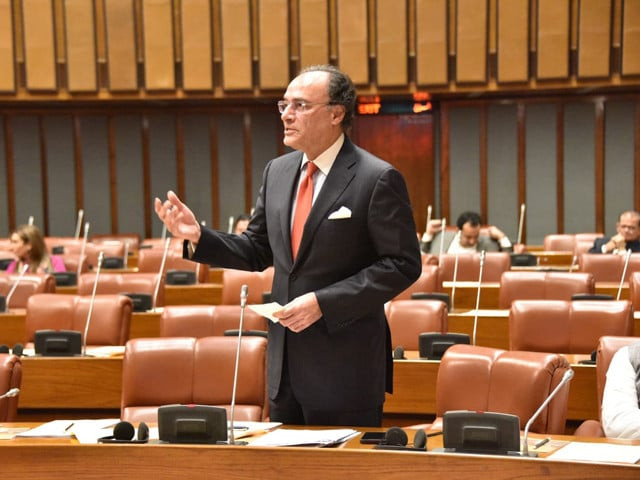Three provinces agree on National Fiscal Pact
Sindh's objections to draft leads to major changes

The federal and at least three provincial governments have conditionally agreed on a new National Fiscal Pact to fulfil a key condition set by the International Monetary Fund (IMF) after the Centre substantially toned down the contract to address concerns expressed by the provinces.
The finance ministry did not confirm till Monday night whether the government of Sindh had also given its consent to the pact, which was designed as an alternative to the National Finance Commission (NFC).
Contrary to public political stance, the government of Khyber-Pakhtunkhwa (K-P) has acted maturely and given its consent to the pact but with certain conditions. Sindh's objections to the draft of the contract led to major changes.
Finance Ministry Spokesman Quamar Abbasi did not reply to a question whether all the provincial governments hadsigned the agreement. He also did not reply whether any changes were made in the draft of the memorandum of understanding (MoU) that was reached with the provinces in July to address provincial concerns.
In order to reach a consensus, the finance ministry did not include the condition of sharing the expenditure on the Benazir Income Support Programme (BISP) by the provinces. It also relaxed the condition of transferring the provincial nature of federal-funded projects to the provinces by linking any such transfer with the consent of the National Economic Council (NEC).
In yet another major concession to Sindh, the reduction in the size of the federal government would be linked with the consensus to be achieved at the level of the Council of Common Interests (CCI) the constitutional forum responsible for taking decisions having implications for both the federal and the provincial governments.
The governments of Punjab, Khyber Pakhtunkhwa and Balochistan have conditionally agreed on the National Fiscal Pact, the finance ministry officials said on Monday the last day for signing the pact by all the five governments. But there were no official words on the signing of the pact by Sindh.
Under the NFC, the provincial share in the federal taxes was increased to 57.5% but the federal government did not fully abolish the responsibilities in the areas of provincial road infrastructure, health and education.
Under the pact, the provincial governments cannot determine agriculture support prices and they will amend the agriculture income tax laws to increase taxes on small farmers equal to federal personal income tax rates and agriculture corporate income rates equal to federal corporate income tax rate.
The federal personal income tax rates are as high as 50% and the corporate rates are 29%, excluding super income tax. The provinces will also take some responsibilities of the expenditures but these are not in line as envisaged by the IMF at the beginning.
It was not clear whether the IMF would accept the toned down pact, which does not fully address the issues to the extent of expenditure on BISP and development projects.
As part of the efforts to expand the narrow tax base and reduce the expenditure burden of the federal government, the IMF has placed a major condition that all the five governments would sign the National Fiscal Pact (NFP) by September 30 and communicate it to the IMF headquarter on the same day.
The NFP is in lieu of the National Finance Commission, which the government is reluctant to amend despite there being consensus between the military establishment and the federal government that the current NFC is a source of perpetual federal fiscal imbalance.
The government is desperate to amend the Constitution to change the colour of the judiciary for political gains. But it is not ready to amend the Constitution to redefine the NFC for the sake of Pakistan's economic viability.
The governments of Punjab and Sindh are the major beneficiaries of the federal government's extravagances and these two provinces raised objections to the original draft of the fiscal pact.
Sources said that in order to address their concerns, the finance ministry made major changes in the draft on September 25th the day the IMF approved Pakistan's $7 billion bailout package that is built around bringing in major structural reforms.
Punjab, Sindh, K-P and Balochistan had signed the MoU in July with the federal government on sharing the fiscal responsibilities. The IMF wanted provinces to make additional contributions for higher education, health, social protection and regional public infrastructure investment schemes.
At the same time, the provinces will take steps to increase their own tax-collection efforts in sales tax on services, property tax, and agricultural income tax. However, no specific targets have been outlined in the agreement, which makes the fiscal pact generic in nature.
"The K-P cabinet has raised more than five questions on the amendments, which we shared with the federal finance ministry and they gave us clarification on them," said Muzzammil Aslam, the Finance Adviser to K-P chief minister.
He said that the K-P government requested the finance minister to immediately form a ministerial committee for achieving consensus. "We committed with the fiscal pact in the interest of the country, however, we reserve the right to take corrective measures if there is any deviation from any clarity provided by the Finance Division," said Aslam.
The province's major concern was any restriction on the movement of wheat from Punjab to K-P. In case of such restriction, the K-P government would begin wheat procurement operations.
What has been agreed?
The provincial governments shall amend the Agricultural Income Tax (AIT) regimes to fully align them, through necessary legislative changes, with the federal Personal Income tax for small farmers and corporate Income tax rate for commercial agriculture tax regimes by end-October 2024.
The provinces will begin taxation of agricultural income under this new regime from January 1, 2025, with collection for the second half of FY 2024-25 agricultural incomes in July 2025, according to the agreement.
The provincial governments shall ensure transition of the sales tax on services from a positive list to a negative list approach to combat tax evasion, taking effect from the start of next fiscal year. The provincial governments will aim to collectively raise revenues from corporate tax in agriculture and GST on services combined with provincial tax effort in expanding additional areas of revenue collection.
At least three provincial governments have agreed that they will develop, implement and collect revenue under a common approach to property taxation. They will implement the necessary administrative reforms to narrow the tax compliance gap, including for the GST.
Importantly, the National Tax Council terms of reference will be expanded to include the design of the relevant tax measures, including property tax and the necessary legal and administrative changes to implement them.
It has been agreed that the provinces shall discontinue announcing support prices for raw commodities and also discontinue procurement operations.
Compromised consensus
The finance ministry had initially proposed that the provinces would provide additional contributions for higher education and to the social protection to the federal government supported initiatives of the Higher Education Commission (HEC) and the BISP.
However, due to Sindh's objections, the finance ministry excluded the words social protection and BISP from the condition under which the provinces should shoulder the burden. It has now been agreed that the provincial governments will provide additional contributions for the HEC and the federal and provincial governments will gradually rebuild spending on health and education programmes as a share of the GDP.
The commitments with regards to the BISP are now generic. It has been agreed that the federal government in consultation with provincial governments will examine social protection programmes rolled out and planned by the provincial governments and BISP, respectively, to identify overlapping programmes and fiscal allocations, and take fiscally prudent measures accordingly, in ways which strengthen and improve generosity and coverage of social protection.
An exception has also been made in fully transferring the PSDP projects by adding a clause that the provinces will cover all of PSDP spending, which benefit solely one province and any spending by the federal government in areas allocated to provinces in the 18th Amendment as per the decision of the NEC, with certain exceptions to be determined by the NEC.
According to another compromised position, the federal government shall reduce its footprint in line with the 18th Amendment but if needed, matters requiring federal and provincial consensus and coordination will be referred to the forum of the CCI or the NEC.


















COMMENTS
Comments are moderated and generally will be posted if they are on-topic and not abusive.
For more information, please see our Comments FAQ